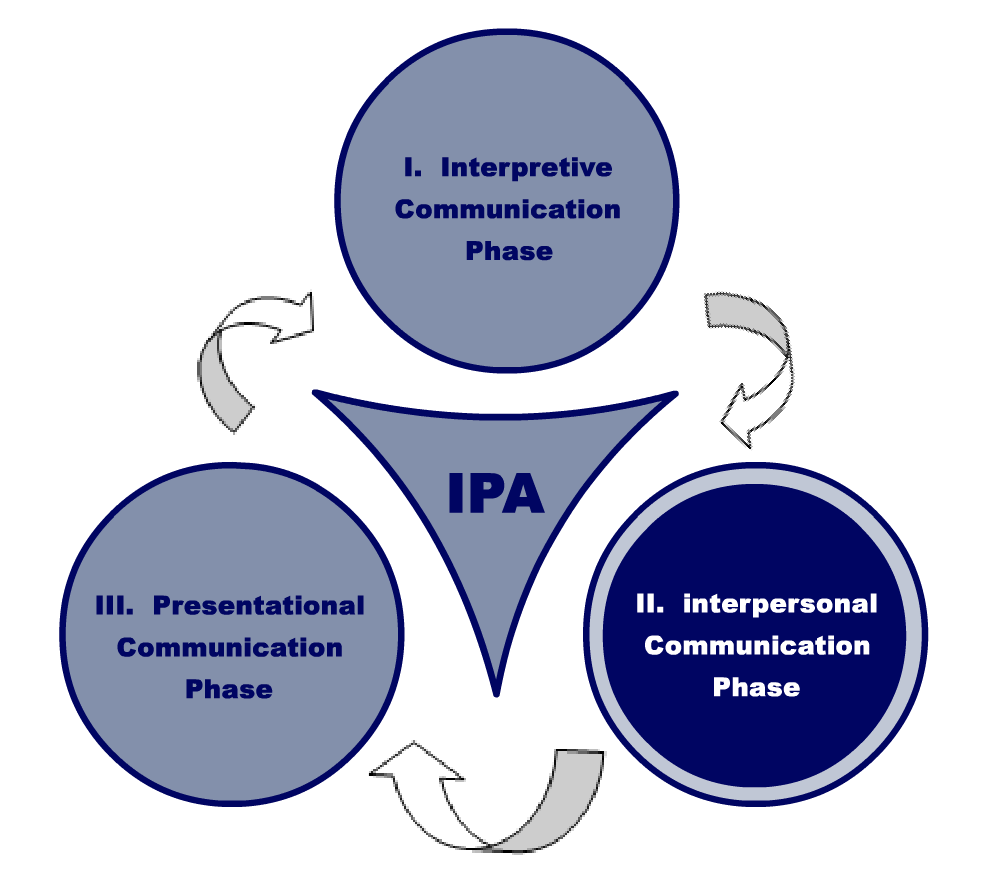 |
|
|||||

|
Example 2: Student Responsibility & Societal Values by Jae Cody Phase 3: Interpersonal Task Materials needed: Description of the Task: Instructions (given orally to students in English):
Sample Written Instruction Set (given to students in German):
I will give the general task instructions orally and in English, and I will ask one or two students to say them back to me to make sure that everyone understands the task. However, I think it is important to give them their actual roles in German so that they can start with a little bit of the language and they won’t try to translate, for example, the reason why they are late directly from English. I will keep partners from the presentational task together, unless there is some kind of problem. I will create pairs using some kind of random method, but I will make changes if any of the partner groups seem too unbalanced. The topics for the interpersonal task will be taken from the presentational tasks of the different groups (each group will have another group’s topic), but the set-up will be the same, regardless of the rule that is used for the example. Both roles require the speaker to explain something. I am looking for dependent clauses and also for modal verbs. The roles might also require some use of the past tense; I would not evaluate that language for accuracy, since it is not a form I expect them to have full control over. I would probably have to do these in the hallway so that the students could have some privacy (and their classmates would not hear, which could give them an advantage). The “on deck” pair would get their roles while I am testing the group before them so that they have time to process and think of any questions before their turn. While I am testing pairs, the rest of the students will be writing journal entries from a writing prompt: What was the biggest challenge in creating a skit for the first graders? What did you like/dislike about the assignment? Description of the Scoring Rubric: Scoring Rubric for the Interpersonal Task For the language control piece, since the language is going to be spontaneous, I will be looking more at whether or not students choose appropriate forms and less at whether the adjective endings, for example, are correct. At this point in their German learning, they should be able to use the present tense without trouble, and I would also expect to hear some modals and dependent clauses, especially since the students would have recently performed skits with those forms in them. I am not including their use as a non-negotiable because I want to see if the students naturally use them for the task (which should require both). If they were on the non-negotiable list, I imagine that students would try to use one right at the beginning of the conversation, rather than using it at the appropriate place. In the event that these target forms are not used, I would go back and talk to the students after the interpersonal task to find out why. This rubric is fairly generic for interpersonal tasks, so I would probably use something similar throughout the year. I would expect students to be familiar with it, but I would go over it the day before the interpersonal task. Do-ability As I mentioned in the introduction, it can be very difficult to keep this class on task. I think that they will be very motivated to perform for the 1st graders (several of them are involved in a video production class that requires acting and creating skits). They are dealing with a theme with which they are very familiar (school), and I think that will help them create the skits. The negotiation involved in the interpersonal task may be intimidating for some of these learners, but I think the practice they will get using modals and dependent clauses during the unit will make those forms a little bit more automatic by the end of the unit. Also, I have built a review of stating opinions into this unit, so that students will have a change to practice that more before they have to defend themselves and their positions in the interpersonal task. The unit (on rules, responsibility, and values will also include a debate about German and American drinking laws (something which is always interesting to high school students). After the students have argued their sides, I will ask the sides to try to come to a compromise, so the students will have some experience negotiating in German shortly before the assessment. This rehearsal of the task, preceded by some teacher modeling, should give the students enough experience and competence to complete the interpersonal task in this IPA (Hall, 1999). That activity will also give me a better idea of what to expect and whether or not my rubric needs to be modified, and let me know if the students may need another day to review the appropriate forms and their uses.
Navigation: Follow the IPA process or go directly to the section that is of most interest to you by clicking on the appropriate category
|
|||||
